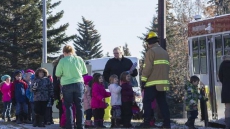OTTAWA — The escalating debate over doctor-assisted death could be the perfect chance for Canada to fix its broken system of palliative care — a "dark secret" that health advocates say has been quietly deteriorating in the shadows for decades.
Terminally ill patients and their family members are forced to take up the slack as a result, said Gabriel Miller, the public issues director of the Canadian Cancer Society, which is scheduled to issue a report next month on the state of palliative care across the country.
"There are thousands of terminally ill Canadians who are not getting the right kind of care," Miller said. "That's causing patients and families unnecessary suffering and it is costing the health-care system precious resources."
Miller is urging the federal Liberal government, along with its provincial and territorial counterparts, to capitalize on the chance to ensure Canadians have universal access to better, affordable end-of-life care.
"We finally have a moment to pull this problem out of the shadows and solve it," he said.
"That's the importance of the broader debate that's unfolding right now. It is a chance to confront a broken system for end-of-life care and make a lasting reform."
With Canada forced to confront the challenges of an aging population and the Supreme Court establishing a deadline, the Canadian Medical Association is also pushing to make sure palliative care reform becomes a political priority.
"Certainly in any conversations we are having now on physician-assisted dying, it is absolutely essential that quality palliative care be available to patients and be seen as one of the options available to them," said CMA president Dr. Cindy Forbes.
The struggle to access appropriate end-of-life care often has a ripple effect on the families of patients, Forbes said.
Helene Hardy of Gatineau, Que., knows the emotional and financial struggle first-hand. She spent eight years helping tend to her husband as he battled cancer.
Families invariably end up having to carry the bulk of the burden, Hardy said.
"We are the invisible backbone of the health-care system," she said. "If every caregiver in Canada right now, today, said, 'Enough,' and brought ... patients to the hospital, I don't know what would happen. Something would collapse."
In an interview, Health Minister Jane Philpott acknowledged the need for meaningful change.
"There is some evidence that only 15 per cent of Canadians have access to high-quality palliative care when they need it," said Philpott, who spent 30 years working as a doctor in Canada and abroad before entering politics.
"That's unacceptable and we are committed to doing better."
The issue of palliative care was also flagged earlier this month in a 134-page report provided to Philpott and her justice counterpart, Jody Wilson-Raybould, by a panel commissioned following last winter's high court ruling.
Canada's health-care structure was founded half a century ago to address the needs of hospital care and physician services, Philpott said. In the 21st century, she said, it must reflect Canadian demand for care — palliative and otherwise — as close to home as possible.
"I know that Canada is flush with experts who have done very well in delivering palliative care and addressing the needs of Canadians at the end of life so we will be consulting broadly in terms of how to do this best," she said.
"I think where we are really going to see movement in terms of that system transformation is through my discussions with my provincial and territorial counterparts to make sure that we look at best practices and look at the best models that have been put in place across the country."
The Liberal government has promised to spend $3 billion over the next four years to improve access to home care, including supports for family care and palliative care, and to make the existing compassionate care benefit more flexible.
Money's not the biggest challenge, said Philpott, who said she will press the need for transformation when she meets with her provincial and territorial counterparts next month in Vancouver.
"I think what we need is some fairly significant changes to our health-care system to modernize it."





